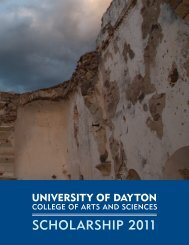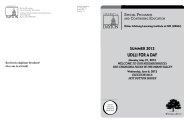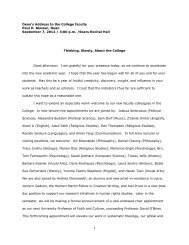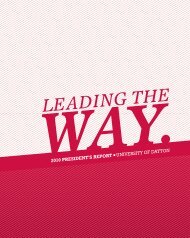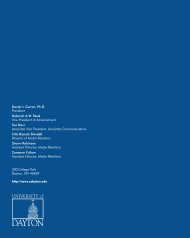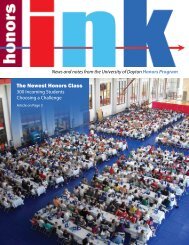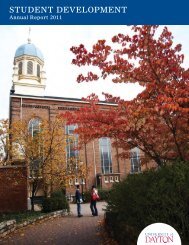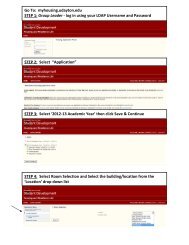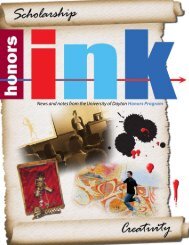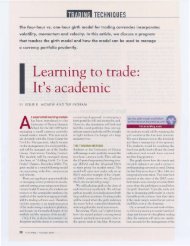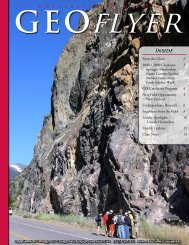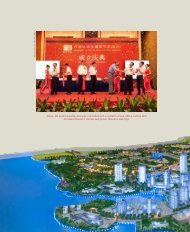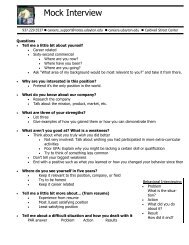Stander Symposium abstract book - University of Dayton
Stander Symposium abstract book - University of Dayton
Stander Symposium abstract book - University of Dayton
You also want an ePaper? Increase the reach of your titles
YUMPU automatically turns print PDFs into web optimized ePapers that Google loves.
9:00 AM to 5:00 PM<br />
Where Women and Disability Studies Meet: Research and Practice<br />
Presenter(s): Keelie M Gustin, Kelly A MacKenzie, Julianne C Morgan, Elizabeth A Myers, Alec M Smidt<br />
Advisor(s): Caroline W Merithew<br />
History & Women and Gender Studies<br />
Senior/Capstone Project<br />
3:00 PM-4:00 PM<br />
Kennedy Union - East Ballroom<br />
For this Panel Presentation, students from the capstone course in Women and Gender Studies (WGS490) will present their semester research<br />
projects which explore the connection between women’s and disability studies.<br />
Nationalist Political Violence in Ireland: The Land League, the Easter Rising, and the Public<br />
Safety Act <strong>of</strong> 1923.<br />
Presenter(s): Randy L Cobb, Caroline M Ibbotson, Mark A Lazcano<br />
Advisor(s): Marybeth Carlson<br />
History<br />
3:00 PM-4:00 PM<br />
Course Project, 12_SP_HST_486_P1 Marianist Hall Learning Space - 218<br />
A selection <strong>of</strong> events pertaining to political violence in Irish history will be examined and related to one another in the scheme <strong>of</strong> Irish nationalism.<br />
In the early 1880s, a mass movement occurred in Ireland. Using ostracism and boycotting, the Land League pushed for greater control <strong>of</strong> land by<br />
the occupiers (peasant farmers). Such tactics <strong>of</strong>ten led to violent acts. Following the arrests the movementâs leaders, the Ladiesâ Land League<br />
emerged and proved even more radical. Finally settled by the Kilmainham Agreement, land control was no longer a political issue. The issue <strong>of</strong> Irish<br />
politics became home rule. Easter 1916: Ireland witnessed an insurrection challenging the rule <strong>of</strong> the British. Irish Republican seized key locations<br />
around Dublin and proclaimed a free and independent Irish Republic. Lasting a mere seven days; the revolution was defeated. Out <strong>of</strong> the ashes <strong>of</strong><br />
this defeat, nationalism would spread among the people <strong>of</strong> Ireland. The rise in nationalistic beliefs led to a growing hunger for independence. The<br />
Irish War for Independence ended in compromise for Republican Nationalists with the Anglo-Irish Treaty, which heavily strained the progression<br />
<strong>of</strong> Irish Nationalism. The Treaty allowed Ireland to have its own parliament, but required legislators to swear an oath to a British executive leader.<br />
The newly formed Free State government faced violent opposition from Republicans who demanded complete independence from Great Britain.<br />
In order to stabilize the country and end the resulting Civil War, the Free State government enacted the Public Safety Act in 1923. The passage and<br />
enforcement <strong>of</strong> the Public Safety Act effectively stamped out any remaining Republican Nationalism, and allowed Great Britain to further sustain<br />
control over Ireland. The Land League, the Easter Rising, and the Public Safety Act all represent and relate to nationalist sentiment leading to the<br />
use and suppression <strong>of</strong> violence.<br />
Navigating the Middle East: Student Field Research in Jordan, Egypt and Morocco<br />
Presenter(s): Lindsey E Cummings, John E McGinnis, Rebecca Young<br />
Advisor(s): Ellen L Fleischmann<br />
History<br />
3:00 PM-4:30 PM<br />
Honors Thesis<br />
LTC - Forum<br />
The Middle East, a region <strong>of</strong> geostrategic interest to the United States and international community, is also a place where human lives have been<br />
shaped by tumultuous political events and social change. The legacy <strong>of</strong> colonialism, wars, uprisings, resurgent religion and nationalism make<br />
their mark in tangible ways on people’s lives every day. Students at the <strong>University</strong> <strong>of</strong> <strong>Dayton</strong> have become increasingly interested in engaging with<br />
the people, history, culture, languages and politics <strong>of</strong> the Middle East through traveling to, studying, and learning about the region. This panel<br />
features the work <strong>of</strong> three students who have engaged in fieldwork in Jordan, Egypt and Morocco for their honors thesis research. The focus is on<br />
how each has confronted the particular methodological challenges <strong>of</strong> doing academic research in a region where local people are daily dealing<br />
with refugee crises, uprisings, contested elections, and rapid paced change. They will discuss questions such as: how does one interview people<br />
living in fear and insecurity? How does one collect research data on sensitive subjects? What are the perils, pitfalls and rewards <strong>of</strong> doing research in<br />
an unstable region undergoing intense change? All three students are pioneering new directions for <strong>University</strong> <strong>of</strong> <strong>Dayton</strong> undergraduate research<br />
that show promise and challenges. Lindsey Cummings will discuss her oral history interviews with Iraqi refugees in Jordan. John McGinnis will<br />
154



